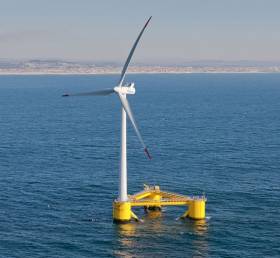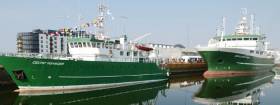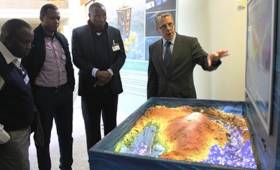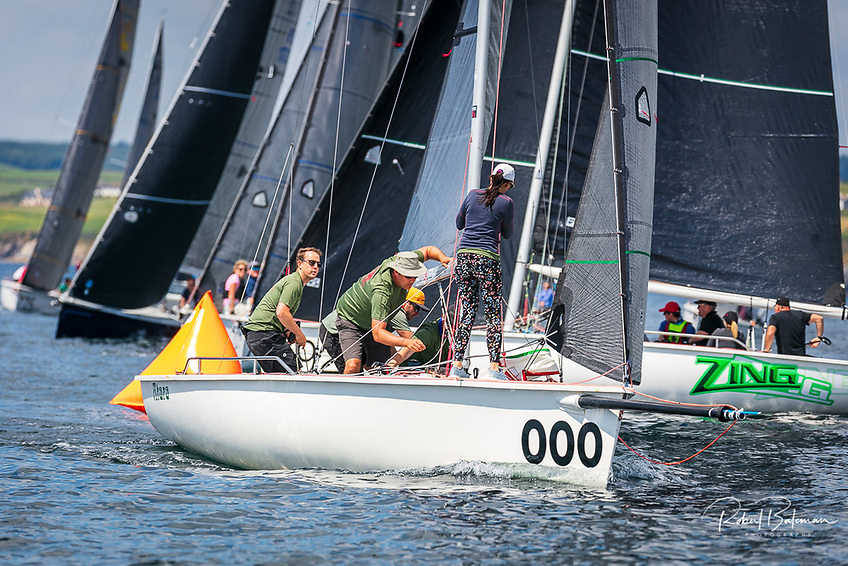Displaying items by tag: Marine Institute
#PowerFromTheSea - The Irish Times reports that the Marine Institute hopes to install wind turbines in Galway Bay for an offshore renewable energy trial.
Permission is being sought for up to three turbines, with a maximum height of 35m above sea level, that would be installed at different times at the current ocean energy test site off Spiddal, along with a prototype offshore power generating station that would cover an area of 37 hectares.
The entire project will open for public consultation on Monday 18 April. The Irish Times has more on the story HERE.
This story was updated to correct the previously reported 60m height of the turbines, which, according to the Marine Institute, was based on a error in the lease application form. The Marine Institute also clarified that the turbines would not be installed concurrently.
The Marine Institute is looking for an experienced manager to join our team in Rinville, Oranmore, Co. Galway as Director of Marine Environment and Food Safety Services. The Marine Institute is the national agency responsible for marine research, technology, development and innovation.
This is an exciting and challenging opportunity to manage one of six service groups within the Marine Institute. Marine Environment and Food Safety Services includes seafood safety testing and monitoring to ensure consumer protection; extensive environmental monitoring programmes to ensure the protection of the marine environment and meet environmental legislation obligations; as well as providing technical and scientific advice to support the sustainable development of the aquaculture industry and other sectors.
We're looking for a motivated and impactful communicator with experience of building effective relationships with stakeholders at a senior level to play a key role as a member of the Marine Institute management team. The successful candidate will work with the management team to develop the Institute's strategic direction and focus and will lead teams including marine environment, fish and shellfish safety, fish health services, ocean chemistry, sea lice monitoring, licensing and policy advice, and quality programmes.
The closing date for applications is 12 noon on Friday 18th March 2016. For more information download the detailed job description.
Marine Institute Hosts Kenyan Delegation
#MarineScience - On Wednesday 17 February the Marine Institute hosted a delegation of officials from the Kenyan Ministry of Agriculture, Livestock and Fisheries.
The delegation, headed by Micheni Ntiba, Secretary General of the Ministry of Agriculture, Livestock and Fisheries, was greeted by Dr Paul Connolly, director of fisheries ecosystems advisory services, who gave an overview of the work carried out at the Marine Institute and highlighted the extensive range of research vessel surveys that support fisheries management.
Tommy Furey of INFOMAR demonstrated how we can map the seabed using the latest technology and also demonstrated the importance of topography, contouring, geology and seabed mapping with Ireland’s first augmented reality (AR) sandbox.
The AR sandbox is based on a concept first developed as part of a National Science Foundation (NSF) funded project lead by visualisation collaboration KeckCAVES at the University of California.
The Delegation toured the building to get a first-hand glimpse of the work undertaken, visiting the biotoxin lab to learn about the work involved in the biotoxin monitoring programme, and the underwater TV survey lab, viewing footage of the burrows of Dublin Bay prawn (Nephrops norvegicus), getting an insight into some of the services provided to the Irish Government.
The delegation remarked that they could see may ideas that could be used in Kenya and that they could learn a lot from the Irish experience with Harnessing Our Ocean Wealth.
Kenya is very interested in developing an integrated marine plan for their ocean resources and the delegates were very interested to hear about Ireland’s Harnessing Our Ocean Wealth strategy and how it has progressed.
There is a new acceptance in Kenya on the importance of the ocean and its potential to contribute to the Kenyan economy.
Marine Institute Board Appoints New Members
#MarineInstitute - The Marine Institute’s new board met for the first time this week at its headquarters in Oranmore, Co Galway where they also had the opportunity to meet many of the staff.
Four new board members were appointed for a period of five years, including Dermot Clohessy, former executive director of the IDA, and Alan Dobson, Professor of Environmental Microbiology at University College Cork.
Also appointed were Prof Owen Lewis, former chief executive of the Sustainable Energy Authority of Ireland (SEAI), and Lorcán Ó Cinnéide, former CEO of the Irish Fish Producers Organisation (IFPO), who was previously a board member from 2010 to 2015.
Marine Institute board chair Dr John Killeen and chief executive Dr Peter Heffernan welcomed their appointment.
"We are delighted to welcome our new board members as they bring new skills and experience to the highly committed board," said Dr Killeen. "The work of the board will be enhanced by the contributions of such high calibre individuals, working together to help build Ireland’s marine sector.”
Dr Heffernan added: “Each of our new board members embody the spirit of community and bring talent, expertise and energy to the table. We are very fortunate to have them by our side as we continue to strengthen our efforts in marine research and innovation.”
More information on the board and the organisation's structure is available on the Marine Institute website HERE.
Marine Institute Offers Work Experience Bursaries
The Marine Institute is inviting students to apply for a number of work experience placements in many exciting areas for this summer 2016. The bursaries are worth €275per week for an 8 to 12 week placement (bursary dependant).They will be based in various locations including the Marine Institute Oranmore, Co. Galway, Newport, Co. Mayo and Wilton Park House, Dublin and other locations/ ports around the country.
The Marine Institute's Bursary Programme provides valuable practical experience for students, in areas of research such Marine Fisheries, Salmon Management, Aquaculture, Environment, Communications, Research Office, Oceanography, Library, Web development, Maritime Development and Fish Health Unit.
The Bursary Programme is aimed at undergraduates of Universities, Institutes of Technology and National Institutes for Higher Education. The Scheme is strictly limited to undergraduates who will have completed two years study in a relevant discipline by the beginning of June.
Previous bursars have gone on to work in the Marine Institute (including two Directors of the Institute), BIM, Regional Fisheries Boards, county councils, pharmaceutical companies, State Laboratories, with some going as far afield as the EPA in Sydney Australia and some now running their own companies.
Marine Researchers Brave Elements For Workshop On Cross-Cutting Opportunities In EU Funding
#MarineScience - More than 60 marine researchers from third level institutes, Government agencies and SMEs braved the elements to get to the Marine Institute in Oranmore on Thursday 7 January for information and advice on the many EU funding opportunities for marine research.
The workshop – titled Cross Cutting Marine Opportunities in EU Funding, as previously reported on Afloat.ie – was organised by the Marine Institute’s Research Office.
Welcoming participants, John Evans, director of policy, innovation and research at the Marine Institute, highlighted the success of Ireland’s marine researchers to date in winning competitive EU funding.
“Irish researchers have won 3.6% of the available funding for Blue Growth topics under the most recent round of results announced by the European Commission for Horizon 2020 Societal Challenge 2, and this rises to 4.6% when marine related topics relating to sustainable food security are considered," he said.
"This is becoming a consistent pattern, with Irish marine researchers winning more European competitive funding than would be expected from a country our size.”
Evans also spoke of the need for a focus on national research collaboration to maintain and improve this competitive position, and the importance of relevant national strategies as tools for researchers preparing funding proposals, specifically Harnessing Our Ocean Wealth – An Integrated Marine Plan for Ireland, and the National Strategy for Science, Technology and Innovation 2015-2020.
The Marine Institute's Dr Fiona Grant, national contact point for marine aspects of Horizon 2020 Societal Challenge 2, gave an overview of the priority topics for Blue Growth with a total of €148.5m available funding with contributions from the Climate, Energy and Transport parts of the Horizon 2020 programme.
'Linking healthy oceans and seas with healthy people’ was one of the key topics covered. Dr Grant mentioned the concept of the ocean as a "blue gym", citing a recent European Marine Board position paper that shows the significant impact of the oceans on human health and wellbeing.
Dr Sean McCarthy of Hyperion Ltd gave very practical advice on how to write a competitive Horizon 2020 proposal, with lots of insights for both new and experienced funding applicants. He told scientists to focus on the potential impact of the research proposal.
“Begin your proposal with impact – the impact is the big issue. Then write the science around the impact,” he said.
Other advice from Dr McCarthy included contacting the national contact point to ensure a better success rate.
“When writing your proposal it’s important to understand how the research priorities have been selected and the national contact point can give you insight into this,” he added.
Gerry Finn, director of the Northern and Western Regional Assembly and national contact point for the INTERREG Atlantic Area, gave an overview of the INTERREG Atlantic Area Programme 2014-2020 and success stories from the 2007-2013 ERDF programmes., under which €12.9m in ERDF funding was approved to 56 Irish projects.
Also speaking on the day was Michael O’Brien, EU Programme liaison officer, who gave an overview of eligibility criteria and guidelines on what makes a successful proposal under this financing mechanism. Four priority areas have been identified which include:
- Stimulating innovation and competitiveness.
- Fostering resource efficiency.
- Strengthening the territory’s resilience to risks of natural, climate and human origin.
- Enhancing biodiversity and the natural and cultural assets.
Over €140m will be available under the call from 2014-2020 which is expected to be launched in the middle of 2016.
O’Brien advised that the technical parameters "are not formally agreed yet by the member states and there may be further changes over the coming weeks. The working group for the programme meets again shortly to advance the progress on the programme manual and application process.”
#MarineNotice - The latest Marine Notice from the Department of Transport, Tourism and Sport (DTTAS) advises that a Marine Institute monkfish and megrim trawl survey will be carried out off the west and southwest coasts of Ireland between 4 and 24 January 2016.
The survey consists of a maximum of 70 fishing stations of one-hour duration each in ICES (International Council for Exploration of the Sea) areas VIIb, c,g, h,j.
Approximate positions for these hauls are given in Figure 1 and Table 1 included in Marine Notice No 52 of 2015, a PDF of which is available to read or download HERE.
Bottom trawling will take place within a 3-nautical0mile radius of these locations.
The survey will be conducted by the RV Celtic Explorer (Callsign: EIGB). The vessel will display all appropriate lights and signal during the survey and will also be listening on VHF Channel 16.
She will be towing a commercial monkfish demersal trawl during fishing operations. The Marine Institute would request commercial fishermen to keep a 3-nautical-mile area around the tow points clear of all commercial gear during the period.
While there is no statutory provision for the loss of fishing gear, the Marine Institute will make every effort to avoid gear adequately marked according to legislation (Articles 9-17 of EU Regulation 404-2011) that may have drifted into the notified areas.
In the event that a fisherman has static gear or other obstructions within 3 nautical miles of the points listed above, it is the responsibility of the owner to notify the survey managers or vessel directly via the following contacts:
- Aodhan Fitzgerald, Marine Institute: 087 248 8765
- Hans Gerritsen: [email protected]
Cross-Cutting Marine Opportunities in EU Funding For Research & Business
#MarineScience - The Marine Institute is hosting a one-day event for marine researchers and SMEs looking at cross-cutting opportunities in Horizon 2020 and the Interreg Atlantic Area Programme.
The first part of the day, on Thursday 7 January 2016 from 9.30am to 5.30pm, comprises a half-day course delivered by Dr Seán McCarthy on how to write a competitive proposal for Horizon 2020.
The aim of this course is to train researchers, research managers and research support services in writing professional and competitive proposals for the 'blue growth' programme.
It will describe the relevance of Horizon 2020 to EU policies, and identify common problems in proposal writing and the success criteria for proposals.
The course provides tips on how to collect information, how to select strategic partners and how to avoid duplication in proposal writing. The final section describes a strategy for proposal writing.
Later, Michael O'Brien of the North & Western Regional Assembly will hold an information session on the Interreg Atlantic programme.
This programme area is rich in maritime heritage and marine resources and boasts a strong Atlantic cultural identity. The area is also challenged by ongoing deficits in innovation and SME competitiveness capacity as well as environmental threats including climate change and threats to the biodiversity of the Atlantic area.
The agreed Programme Priorities respond to these challenges and will furthermore exploit opportunities in niche areas such as green growth, renewable energies and eco-Innovation.
The eligible priorities for the 2014-2020 programme period are:
- Stimulating innovation and competitiveness.
- Fostering resource efficiency.
- Strengthening the territory's resilience to risks of natural, climate and human origin.
- Enhancing biodiversity and the natural and cultural assets.
In the afternoon there will be opportunities for one-on-one advisory meetings with national contact points. Meeting rooms will also be available for breakout sessions if required.
For more information on the day and how to attend, visit the Marine Institute website HERE.
Transition Year Students Visit Marine Institute
#MarineScience - The Marine Institute welcomed more than 300 Transition Year students during Science Week as part of the Galway Science & Technology Festival and the Sea for Society FP7 project.
The pupils met marine scientists and staff to learn about the wide variety of work they do, and how the science of the sea impacts on our daily lives, for example the food we eat, the air we breathe, and the water we drink.
Dr Paul Connolly, director of fisheries ecosystems and advisory services, gave an overview of the broad work programmes of the Marine Institute and the many benefits we derive from the ocean.
Students also saw a short video on the recently commissioned Galway Bay Ocean Observatory, which streams live data and video from the seabed off the coast of Spiddal.
Marine Institute chief executive Dr Peter Heffernan said: "We're delighted see so many students here and hope they'll be inspired by the people they meet and by work that we're doing here to understand our unique ocean resource.
"I'm sure we'll see some of them again as ocean explorers, marine biologists, oceanographers, or geographers mapping the seabed, or as engineers, developing novel marine renewable energy devices. I believe they will have many opportunities, particularly with a national and EU focus on the potential of the 'blue economy' with the Government plan Harnessing Our Ocean Wealth and the European Commission's Atlantic Strategy."
Vera Quinlan, of INFOMAR, the national seabed mapping programme by the Marine Institute and Geological Survey of Ireland, demonstrated her work mapping the seabed using the latest technology – and discovering mountains in the Atlantic ocean higher than Carrauntoohil.
Quinlan has developed Ireland's first augmented reality (AR) sandbox based on a concept first developed as part of a National Science Foundation (NSF) funded project led by the visualisation collaboration KeckCAVES at the University of California.
The visiting Transition Years were the first students to try out the AR sandbox, a scientific educational tool to help users to explore the importance of topography, contouring, geology and seabed mapping.
"We constructed the AR sandbox as part of the education and outreach program for INFOMAR and we believe that it will help share the story, the science, and the adventure that is INFOMAR," said Quinlan.
Fisheries scientists explained how they assess fish stocks so that we know the sustainable limits for fishing. Students learned about ocean acidification and had an opportunity to carry out experiments on pH levels.
They also learned about the science behind seafood safety, and met the scientists that make sure the Irish shellfish we eat are free from naturally occurring toxins.
AquaTT, lead Irish partner in the Sea for Society FP7 project, helped to promote the project and the Blue Society concept, highlighting that the ocean is home to millions of undiscovered species; provides us with food and transport as well as essential biological, mineral and energy resources; regulates our climate; and is at the heart of the water cycle, producing half of the oxygen we breathe.
In addition, students got to test-drive a mini submarine (ROV) with the help of the Research Vessel Operations team, and were introduced to a wide variety of marine career opportunities as well as maritime training opportunities by the Irish Maritime Development Office (IMDO).
The Marine Institute will be at the Galway Science & Technology Festival Exhibition this Sunday 22 November alongside Galway Atlantaquaria with the Explorers Education programme for primary schools.
Marine Institute Recruitment Drive Closing Soon
#Jobs - Applications close this coming Friday 13 November for a number of scientific management and research positions with the Marine Institute.
Those interested in various Scientific & Technical Officer roles – in Project Support, Ocean Modelling, Observing Systems (JERICO Next), Habitat Mapping and the 'Value Added' strand of the INFOMAR programme – have until 4pm this Friday to submit their applications.
Also closing on the same day are the positions of Hydrographic Data Processor (INFOMAR), Team Leader on infrastructure projects such as EMSODEV and FIXO3, and a vacancy for a post-doctorate researcher on creating knowledge for precision fisheries management.
Prospective applicants have a little longer for the vacancy in Administrative, Research & Project Support in the Stagaire programme (closing Wednesday 18 November) and the last available spots in the two-year full-time Masters of Commerce Scholarship in Strategic Marketing (closing Monday 30 November).































































